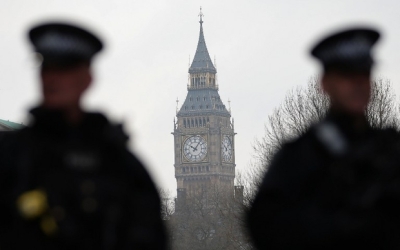UK and Islam: Prevent review is a dangerous whitewash

It is curious that William Shawcross feels he is in a position to make sweeping statements about how the primary focus of Prevent must be “Islamist extremism”, despite his limited knowledge of Muslim beliefs and apparent prejudice against Islam - if his recent “independent” report into Prevent is anything to go by.
Coupled with the review’s lack of engagement with Muslim organisations, or with any groups expressing similar concerns about the violations inherent in the Prevent programme, this must have put Shawcross in a tight spot.
The report ignores key issues that go to the heart of protecting people in this country
The report is problematic right from the start, noting that six “terrorist attacks” have occurred in Britain since the review was commissioned in 2019. “All these attacks were Islamist in nature,” Shawcross states. But the list omits other incidents of far-right violence, including a March 2019 white supremacist attack targeting Muslims and the October 2022 bombing of a migrant processing centre in Dover.
Why does the report ignore “non-Muslim” ideological violence? What kind of message does this send to the violent far-right community and others in Britain?
New MEE newsletter: Jerusalem Dispatch
Sign up to get the latest insights and analysis on Israel-Palestine, alongside Turkey Unpacked and other MEE newsletters
Those of us who said this report would be a whitewash, surely did not estimate that it would be to this extent. We are not arguing for an expansion of Prevent by asking these questions; rather, they should be a warning for all people living in Britain who are concerned about public safety and an increasingly nationalist government that seems out of touch with its people and its purpose.
Combating violence
Neil Basu, Britain’s former chief counter-terrorism officer, told the Guardian that the Prevent review appeared to be driven in part by a rightwing ideology, and was “insulting” to professionals trying to combat attacks.
Indeed, the review risks making Britain more unstable and more unsafe. Rights and Security International, which submitted a freedom of information request pertaining to the review process, has alleged that the Home Office might have “interfered significantly” in the drafting of the report, before wholeheartedly accepting all its recommendations. The Home Office has said the group’s concerns are “unwarranted”.
The inaccuracies and conjecture contained within the report raise many questions. It notes that 80 percent of “live investigations” by counter-terrorism police are “Islamist” in nature, a statistic surely meant to evoke fear and awe, regardless of the fact that these individuals have not been tried or convicted. In addition, it has never been established that Prevent interventions have any impact on live investigations.
The report ignores key issues that go to the heart of protecting people in this country, including that counter-terrorism officers themselves are subject to the harms of Prevent, feeding the institutional Islamophobia seen across the counter-terrorism and policing space. For example, the National Association of Muslim Police has reported that officers were referred to Prevent by their own colleagues over their Islamic appearance and beliefs. Such incidents create division among those who must be united to protect us.
The report also ignores the experiences of hundreds of young people who have been interrogated on their beliefs with no parent or guardian present, in a confusing, traumatic interface with the government that they are expected to one day respect and even support.
Rubber-stamped review
In announcing the Prevent review in 2019, Ben Wallace, then serving as security minister, said it “should expect those critics of Prevent, who often use distortions and spin, to produce solid evidence of their allegations”.
Two years later, when Shawcross was appointed to lead the review, the concerns of human and civil rights groups translated into a boycott - a proactive action that we hoped would compel change in what was sure to be a rubber-stamped, farcical process. We were correct, and the review came at a great and unfortunate expense to the British taxpayer.
Whether the Prevent duty is re-shifted to focus more on Muslims or on any other group, the societal harm will be the same
In the absence of a credible government-commissioned review, those keen to work towards positive change can instead look to the People’s Review of Prevent, which drew on more than 600 testimonies and documents from individuals supported by Prevent Watch and other organisations.
We ran advisory panels with experts in the field of Prevent and its impacts across different sectors and themes, including education, human rights and data privacy. Our report drew from major academic studies published by human rights groups, along with government reviews and UN rapporteurs on counter-terrorism.
Having been a caseworker at Prevent Watch for more than three years, I have directly supported more than 200 people harmed by Prevent. Our group is in a solid position, alongside allies and experts, to identify patterns of harm.
Having dealt with referrals related to both Islamist and far-right concerns, it is clear that neither group of children deserve to be treated with suspicion for using terms such as “jihadi” or having a keen interest in history, as we have documented. Whether the Prevent duty is re-shifted to focus more on Muslims or on any other group, the societal harm will be the same.
The views expressed in this article belong to the author and do not necessarily reflect the editorial policy of Middle East Eye.
Middle East Eye delivers independent and unrivalled coverage and analysis of the Middle East, North Africa and beyond. To learn more about republishing this content and the associated fees, please fill out this form. More about MEE can be found here.





